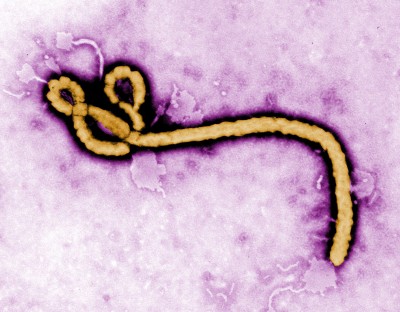
In a report from Massachusetts General Hospital, a survey found that many physicians overestimate their ability to assess the risk of Ebola. PHOTO COURTESY CDC GLOBAL
Researchers at Massachusetts General Hospital have found that the physicians least likely to encounter the infectious Ebola virus tend to be overly cautious even with low-risk patients.
The report titled “Ebola Risk and Preparedness: A National Survey of Internists” highlights the need for better communication and education, according to an Aug. 27 press release. Authors also explored the unintended impacts of the infectious outbreak and the stigma it may have unintentionally caused.
Ishani Ganguli, one of the authors of the report, said the team of researchers explored the sources of information most primary care physicians referenced when dealing with a potential Ebola patient. Over 75 percent used the Centers for Disease Control and Prevention’s guidelines, she said.
“Then we looked at how people felt with Ebola as a diagnosis, and how they felt talking to patients about it, and we found that most felt very or somewhat prepared to communicate about Ebola, to tell patients about it, or to diagnose it,” she said.
In 2014, an outbreak of Ebola hemorrhagic fever originated in West Africa and spread to other countries including the United States, United Kingdom and Italy, according to the CDC website. In the United States, there were four reported cases.
The first locally diagnosed case in Dallas led to distrust of health officials when they began to quarantine symptom-free international workers and request that students and employees with connections to the disease remain at home, the report stated.
Ganguli explained how people sometimes became fearful when they learned of the threat without knowing enough about it.
“Part of our interest in doing this was that we had observed in the press and the reports for the CDC, for example, that there were examples of people overreacting to this threat and not really knowing what to make of it,” she said.
Despite the confidence expressed by most physicians, some did not properly treat patients, according the release.
“While most primary care physicians responding to a survey taken in late 2014 and early 2015 expressed confidence in their ability to identify potential cases of Ebola and communicate Ebola risks to their patients, only 50 to 70 percent of them gave answers that fit with CDC guidelines when asked how they would care for hypothetical patients who might have been exposed to Ebola,” the release stated.
This information merely highlighted the need for better education and communication regarding the disease, Ganguli said. Improvement in these areas could also translate to a university setting, in the event of future outbreaks.
Several residents said they appreciate that there is more information on how to address Ebola, yet still are wary about the spread of infectious diseases.
Ana Acevedo, 24, of Allston, said she knew about the restrictions in response to the disease, and felt that health officials properly handled the situation.
“I know that for people coming in through the airports, there were restrictions, and I know they [officials] had to do it because there are so many people that could be exposed,” she said. “It’s good how they’ve handled it.”
Irma Garcia, 28, of East Boston said she felt better knowing that people are looking at the way Ebola is being handled.
“I use public transportation all the time and I think about diseases and how many people there are around, and I still think it’s good that people are looking at restrictions and how it’s handled,” she said.
Nalaphas Piyalangka, 23, of Brighton, expressed her fear for Ebola and how she feels that restrictions are positive.
“I’m not sure about the U.S., but in my country [Thailand], we have many immigrants and it’s difficult to control what is coming in for diseases,” she said. “Here, in Boston, I’m still scared though because you still can never know who has Ebola. It’s still a big problem and needs to remain restricted.”
The post Many physicians overestimate ability to assess risk of Ebola, study finds appeared first on The Daily Free Press.
